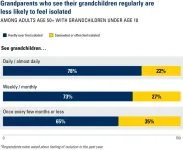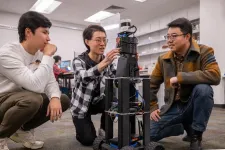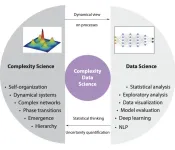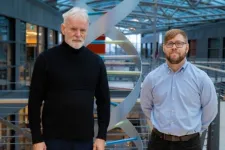(Press-News.org) As many Americans prepare to gather with their families for the holidays, a new poll shows the importance of grandchildren in grandparents’ lives.
The poll also suggests that having grandchildren and seeing them regularly may have a link to older adults’ mental health and risk of loneliness.
Although the poll can’t show cause and effect, the findings suggest a need to study the role of grandparenting in older adults’ lives, as part of a broader effort to address social isolation.
At the same time, the poll found that many grandparents support their grandchildren under 18 in some way, from covering major expenses to providing childcare or babysitting regularly, or even daily.
The data come from the National Poll on Healthy Aging, based at the University of Michigan’s Institute for Healthcare Policy and Innovation. The poll is supported by AARP and Michigan Medicine, U-M’s academic medical center.
In all, the poll shows, 60% of adults aged 50 and over have at least one grandchild, including step-grandchildren, adopted grandchildren and great-grandchildren. That includes the 27% who said they have five or more grandchildren.
Those over age 65 were much more likely than those in their 50s and early 60s to say they have one or more grandchildren, at 76% versus 46%.
People with at least one grandchild were more likely than those without grandchildren to say they hardly ever feel isolated. In all, 72% of those with grandchildren say they hardly ever feel isolated, compared with 62% of those without grandchildren. People without grandchildren were also more likely to say their mental health is fair or poor compared with those who have grandchildren (13% versus 9%).
“For many older people, becoming a grandparent is a major milestone in their lives. Our findings show there are many dimensions to grandparenting, and possible positive effects of grandparenting, some of which may not be widely recognized,” said Kate Bauer, Ph.D., an associate professor of Nutritional Sciences in the U-M School of Public Health who worked with the poll team.
“With growing attention by policymakers to the role of social interaction in the well-being of people over age 50, and also the struggles of older adults who are raising children under 18, we hope our findings will inform those policy discussions,” said Bauer.
Poll director Jeffrey Kullgren, M.D., M.P.H., M.S., an associate professor of internal medicine at U-M and a physician at the VA Ann Arbor Healthcare System, says, “Health care providers should consider asking their older patients whether they are active in their grandchildren’s lives, and perhaps encourage more involvement among those who are struggling with loneliness or depression, even if they live far apart and need to connect virtually when they can’t be together.”
Caring for children
Nearly half (49%) of those who have grandchildren under age 18 provide care for them at least once every few months.
In all, 20% of those with grandchildren under 18 care for one or more grandchild at least once a week, with 8% providing daily or near-daily care. Ten percent of grandparents who are age 50 to 64 reported providing daily or near-daily care, compared with 6% of those age 65 and over.
Older adults who identified as Hispanic were more likely to say they take care of a grandchild under 18 every day or nearly so, at 15% compared with 7% of non-Hispanic white, and 9% of non-Hispanic Black older adults who have grandchildren under age 18. With the high cost and limited availability of childcare in the U.S., grandparents who provide regular care for their grandchildren are giving their families a valuable resource, Bauer notes.
Seeing grandchildren
The poll asked older adults who have grandchildren under age 18 how often they see them. In all, 18% of grandparents see their grandchild or grandchildren every day or nearly every day, an additional 23% see them at least once a week and 23% see them once or twice a month, while 36% said they only see them every few months or less.
In general, grandparents who see their grandkids more often were less likely to say they feel isolated. Overall, 78% of those who see grandchildren under 18 every day or nearly every day said they hardly ever feel isolated, compared with 65% of those who see their grandchildren every few months or less. Also, 73% of those who see their grandchildren at least weekly or once or twice a month said they hardly ever feel isolated.
There was a similar trend when the poll team looked at those who reported hardly ever feeling a lack of companionship. In all, 57% of grandparents who see their grandchildren only every few months reported feeling this way, compared with around 70% of those who see them more frequently.
Those grandparents who see their grandchildren only every few months or less were more likely to say their mental health is fair or poor (13%) compared with those who see them at least once a week (4%) or once or twice a month (8%). There was no difference for physical health status.
Eating with or cooking with grandchildren
Bauer’s research focuses on social factors related to children’s eating behaviors and weight. The poll asked older adults who have grandchildren ages 1 to 17 whether they had engaged in food-related activities with their grandchildren in the past month.
In all, 61% of these older adults said they had shared at least one meal with a grandchild or grandchildren in the past month, and 47% said they had prepared food for them, while an equal percentage said they had bought food for their grandchildren. And a sizable percentage – 36% -- said they had baked or cooked with their grandchildren in the past month.
“Eating, and especially cooking, with grandchildren can be an opportunity for older adults to make important social and cultural connections, such as passing down knowledge and recipes,” said Bauer. “Given how many grandparents are frequently engaging with their grandchildren around food and eating, it is important that they relay positive and healthy messages about nutrition and body size.”
Paying for grandchildren’s expenses
Overall, nearly one-third (32%) of older adults who have grandchildren under age 18 say they have helped provide financial support to them in some way in the past year.
This includes 23% who helped with day-to-day expenses such as clothes, meals and groceries; 10% who paid for educational expenses; and 10% who provided support for other big expenses such as summer camps, sports and daycare.
Living with grandchildren
Among all adults aged 50 and older who have grandchildren, 6% live in the same home as at least one of their grandchildren. This percentage was higher among Black older adults (9%) and Hispanic older adults (9%) compared with white older adults (5%), and among older adults in their 50s and early 60s (8%) compared with those over age 65 (4%).
Also, among those who have grandchildren, 3% said they have primary custody or primary parental responsibility of a grandchild aged 17 or younger. The percentage was higher (6%) among grandparents who are age 50 to 64, compared to those age 65 and older (1%).
Bauer notes the grandparents who take on full-time roles caring for grandchildren – forming what are sometimes called “grandfamilies” – can play a critical role in providing stability during challenging times in children’s lives. More research is needed on their role.
Michigan findings
Thanks to funding from the Michigan Health Endowment Fund, the poll team also looked at grandparenting among 1,174 Michiganders aged 50 and over.
In all, 63% of Michiganders in this age group have at least one grandchild, including 51% of those in their 50s and early 60s and 74% of those age 65 and over.
Older adults living in northern, central and southwestern Michigan were more likely to be grandparents than those in the southeastern part of the state.
When it came to providing daily or nearly daily care for grandchildren under age 18, Michiganders reported doing so at about the same percentages as those in the rest of the country. But 25% of older Black Michiganders said they provide daily or near-daily care to a grandchild or grandchildren, higher than the national percentage, while the rate of daily or near-daily grandchild care among white Michiganders was around 6%, similar to the national figure.
In addition, 30% of Black Michigan grandparents said they see their grandchildren every day or nearly every day compared with 15% of white Michigan grandparents. Also, older Michigan women were more likely to say they see their grandchildren every day or nearly every day compared with men (21% versus 11%).
Grandparents living in the southeastern region were more likely to be part of ‘grandfamilies’ by having custody of at least one grandchild, with 5% saying they do, compared with 3% or less elsewhere in the state.
The poll findings come from a nationally representative survey conducted by NORC at the University of Chicago for IHPI and administered online and via phone in August 2024 among 3,486 adults ages 50 - 94 across the U.S. The Michigan sample included 1,174 respondents ages 50 - 94. The samples were subsequently weighted to reflect the U.S. and Michigan populations.
END
Grandparents help grandkids in many ways – but the reverse may be true too, poll suggests
Less loneliness and better mental health seen among those who see or care for grandchildren often
2024-11-12
ELSE PRESS RELEASES FROM THIS DATE:
Giving robots superhuman vision using radio signals
2024-11-12
In the race to develop robust perception systems for robots, one persistent challenge has been operating in bad weather and harsh conditions. For example, traditional, light-based vision sensors such as cameras or LiDAR (Light Detection And Ranging) fail in heavy smoke and fog.
However, nature has shown that vision doesn't have to be constrained by light’s limitations — many organisms have evolved ways to perceive their environment without relying on light. Bats navigate using the echoes of sound waves, while sharks hunt by sensing electrical fields from their prey's movements.
Radio waves, whose wavelengths are orders of magnitude ...
Digital twins and complexity data science
2024-11-12
A Perspective suggests that “digital twins” are not simply tools for science but are an example of the integration of complexity science and data science into a new scientific field. A “digital twin” is a digital representation of a real-world object or system. The idea emerged from manufacturing but has been adopted by science, especially by the fields of medicine, immunology, and epidemiology. Digital twins are typically frequently or continuously updated and improved with real data from the real object the digital twin mirrors, allowing ...
‘Moonlighting’ enzymes can lead to new cancer therapies
2024-11-12
Researchers at the Centre for Genomic Regulation (CRG) reveal that metabolic enzymes known for their roles in energy production and nucleotide synthesis are taking on unexpected "second jobs" within the nucleus, orchestrating critical functions like cell division and DNA repair.
The discovery, reported across two separate research papers out today in Nature Communications, not only challenges longstanding biological paradigms in cellular biology but also opens new avenues for cancer therapies, particularly against aggressive tumours like triple-negative breast cancer (TNBC).
For decades, biology textbooks have neatly compartmentalised ...
One genomic test can diagnose nearly any infection
2024-11-12
Next-generation metagenomic sequencing test developed at UCSF proves its effectiveness in quickly diagnosing almost any kind of pathogen.
A genomic test developed at UC San Francisco to rapidly detect almost any kind of pathogen – virus, bacteria, fungus or parasite – has proved successful after a decade of use.
The test has the potential to vastly improve care for neurological infections that cause diseases like meningitis and encephalitis, as well as speed up the detection of new viral pandemic threats. It uses a powerful genomic sequencing ...
Blood vessel-like coating could make medical devices safer for patients
2024-11-12
University of B.C. researchers have developed a groundbreaking coating that could make medical devices safer for millions of patients, reducing the risks associated with blood clots and dangerous bleeding.
The new material, designed to mimic the natural behavior of blood vessels, could allow for safer use of blood-contacting devices like catheters, stents, blood-oxygenation machines and dialysis machines—especially in cases where blood clots are a significant concern.
“This discovery could be a transformative step in the development of safer medical devices,” said Dr. Jayachandran Kizhakkedathu, ...
Sleep is no light matter for bees
2024-11-12
In an emerging red flag for the digital era, sleep experts have warned us to avoid screen time in bed, sounding the alarm that light emitted from phones and other electronic devices can disrupt our sleep patterns. That’s one way that science is waking up to the broad range of health and disease implications related to circadian biology and our daily sleep-wake cycles.
Now, researchers at the University of California San Diego have found that light disruption is not only a health concern for humans. A new study led by PhD candidate Ashley Kim and Professor James Nieh in the School of Biological Sciences has found that artificial light disrupts the circadian rhythms of ...
New study explores the role of BMI in disease risk
2024-11-12
New study from deCODE genetics/Amgen highlights the importance of BMI in pathogenesis of disease, suggesting that reducing BMI alone could lower the risk of several diseases.
Scientists at deCODE genetics, subsidiary of Amgen, published a study today in Nature Communications that sheds light on how Body Mass Index (BMI) influences the risk of various diseases that are comorbid with obesity. The study, which used genetic data from Iceland and the UK Biobank, looked at whether disease risk associated with BMI-related sequence variants are explained completely or partially by their effect on BMI.
The results showed that for some conditions, such as fatty liver disease, glucose intolerance, ...
Guardian, kids, or companions? What do dogs mean to us today
2024-11-12
What role do dogs play in today’s world? For many, they are more than just pets. New findings from the Department of Ethology at Eötvös Loránd University show that whether seen as friends, family members, children or guardians, these roles affect the way dogs are cared for, suggesting shifting dynamics in human-animal bonds shaped by societal trends and individual owner profiles.
In Western cultures, more and more people see their dogs as their best friends, family members or even their furry children. In fact, ...
NeuroMechFly v2: Simulating how fruit flies see, smell, and navigate
2024-11-12
All animals, large or small, have to move at an incredible precision to interact with the world. Understanding how the brain controls movement is a fundamental question in neuroscience. For larger animals, this is challenging because of the complexity of their brains and nervous systems. But the fruit fly, Drosophila melanogaster, has a smaller and therefore more easily mappable brain, allowing scientists to gain detailed insights into how its nervous system drives behavior.
To understand how the nervous system controls actions, researchers at the group of Pavan Ramdya at EPFL created a simulated reality where a virtual fly can operate ...
“Drowning” mangrove forests in Maldives signal global coastal threat
2024-11-12
Researchers have found evidence that mangrove forests – which protect tropical and subtropical coastlines – are drowning in the Maldives.
Their findings, published today (Tuesday 12 December) in Scientific Reports, indicate that rising sea level and a climate phenomenon known as the Indian Ocean Dipole have led to some Maldivian islands losing over half of their mangrove cover since 2020.
The research team, led by Northumbria University, warn that the findings have implications not only for the Maldives, but also for other island nations and coastal ecosystems around the world.
In 2020, more than a quarter of the Maldivian islands containing mangrove forests saw their trees experiencing ...
LAST 30 PRESS RELEASES:
Industrial research labs were invented in Europe but made the U.S. a tech superpower
Enzymes work as Maxwell's demon by using memory stored as motion
Methane’s missing emissions: The underestimated impact of small sources
Beating cancer by eating cancer
How sleep disruption impairs social memory: Oxytocin circuits reveal mechanisms and therapeutic opportunities
Natural compound from pomegranate leaves disrupts disease-causing amyloid
A depression treatment that once took eight weeks may work just as well in one
New study calls for personalized, tiered approach to postpartum care
The hidden breath of cities: Why we need to look closer at public fountains
Rewetting peatlands could unlock more effective carbon removal using biochar
Microplastics discovered in prostate tumors
ACES marks 150 years of the Morrow Plots, our nation's oldest research field
Physicists open door to future, hyper-efficient ‘orbitronic’ devices
$80 million supports research into exceptional longevity
Why the planet doesn’t dry out together: scientists solve a global climate puzzle
Global greening: The Earth’s green wave is shifting
You don't need to be very altruistic to stop an epidemic
Signs on Stone Age objects: Precursor to written language dates back 40,000 years
MIT study reveals climatic fingerprints of wildfires and volcanic eruptions
A shift from the sandlot to the travel team for youth sports
Hair-width LEDs could replace lasers
The hidden infections that refuse to go away: how household practices can stop deadly diseases
Ochsner MD Anderson uses groundbreaking TIL therapy to treat advanced melanoma in adults
A heatshield for ‘never-wet’ surfaces: Rice engineering team repels even near-boiling water with low-cost, scalable coating
Skills from being a birder may change—and benefit—your brain
Waterloo researchers turning plastic waste into vinegar
Measuring the expansion of the universe with cosmic fireworks
How horses whinny: Whistling while singing
US newborn hepatitis B virus vaccination rates
When influencers raise a glass, young viewers want to join them
[Press-News.org] Grandparents help grandkids in many ways – but the reverse may be true too, poll suggestsLess loneliness and better mental health seen among those who see or care for grandchildren often










